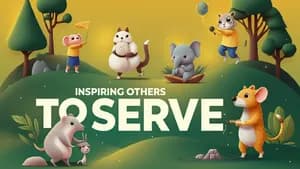Introduction: The Power of Giving Back
In today's world, it's easy to get caught up in the whirlwind of academics and extracurricular activities. However, fostering a sense of social responsibility and community engagement is just as crucial as academic success. Integrating volunteerism into your educational journey isn't just about adding another item to your resume; it's about cultivating empathy, developing crucial life skills, and building a stronger, more compassionate community. This article explores the profound benefits of volunteering and provides practical strategies for incorporating service into your life, both inside and outside the classroom.
I've witnessed firsthand the transformative impact of service on students. I recall a project where high school students mentored elementary school children in reading. The high schoolers not only improved their own tutoring skills but also gained invaluable confidence and a deeper understanding of the importance of patience and commitment. This experience profoundly shaped their understanding of community involvement, and many continue to volunteer years later.
Finding Your Perfect Volunteer Match: Identifying Interests and Needs
The key to successful and fulfilling volunteer work lies in finding opportunities that align with your passions and interests. Don't feel pressured to choose something simply because it looks impressive on a college application. Instead, consider your strengths and what causes resonate deeply with you. Do you love animals? Look into local animal shelters or wildlife rehabilitation centers. Are you passionate about the environment? Consider participating in park cleanups or environmental advocacy groups.
Exploring your local community is also crucial. Many organizations rely on volunteers to perform essential tasks, from assisting at food banks and soup kitchens to helping with administrative work at non-profits. Talk to your school counselors, teachers, and family members. They may be aware of opportunities you hadn't considered. Websites like VolunteerMatch and Idealist also offer extensive listings of volunteer opportunities based on location and interest. Don't be afraid to try different roles; you might discover a hidden talent or passion you didn't know you had!
Remember, even small acts of service can have a significant impact. You don't have to commit to a large-scale project right away. Starting with shorter, more manageable commitments allows you to gradually expand your involvement as you build confidence and experience.
Integrating Service into Academics: Connecting Learning and Action
Volunteerism isn't just an extracurricular activity; it can be powerfully integrated into your academic pursuits. Many schools offer service-learning projects, where volunteering is directly tied to classroom learning. If your school doesn't have such programs, you can still proactively connect your volunteer work with your academic studies.
For instance, if you're studying history, consider volunteering at a historical society or museum. You could assist with archival research, help with educational programs, or even contribute to the preservation of historical artifacts. This approach allows you to apply your classroom knowledge in a real-world setting, making learning more engaging and meaningful. Similarly, if you're studying environmental science, volunteer work at a nature preserve or environmental organization provides hands-on experience in conservation, ecology, and environmental advocacy.
Connecting volunteer work with your academic pursuits deepens your understanding of the subject matter and enhances your learning experience. It allows you to develop critical thinking skills through practical application and fosters a deeper appreciation for the impact of your studies on the wider world.
Developing Essential Life Skills: Building Your Toolkit for the Future
Volunteering provides opportunities to develop numerous life skills that extend far beyond the classroom. Through your service, you'll gain experience in teamwork, communication, problem-solving, and leadership. You'll learn to work collaboratively with people from diverse backgrounds, building interpersonal skills and improving your ability to communicate effectively. These experiences will not only enhance your college applications but also prepare you for a successful career and life.
Moreover, volunteering strengthens your time-management skills and builds your resilience. Juggling your volunteer commitments with your studies requires careful planning and organization, reinforcing the ability to manage your time effectively. Encountering challenges during your volunteer work teaches you how to persevere, adapt, and learn from setbacks. These skills are invaluable in both academic and professional settings. I've seen countless students grow immensely in confidence and maturity through their commitment to service, demonstrating a greater ability to handle stress and challenges.
Sustaining a Lifelong Commitment: Making Service a Habit
The true benefit of integrating volunteerism into your education lies not only in the immediate impact but in cultivating a lifelong commitment to service. To ensure that your volunteer experience is transformative and sustainable, it's important to reflect on your experiences, identify what you've learned, and set goals for future involvement. Keeping a journal or a log of your volunteer activities can help you track your progress, identify areas for growth, and celebrate your achievements.
Discuss your experiences with friends and family; sharing your stories with others not only helps solidify your own understanding but also inspires others to get involved. Consider becoming a mentor or leader within your chosen volunteer organization, allowing you to share your knowledge and experience with new volunteers. By actively engaging in sustained service, you'll develop a deep sense of social responsibility and a commitment to making a positive impact on your community and the wider world. I often encouraged my students to reflect on their volunteer journey, understanding that service is not a one-time event, but a continuous process of learning and growth.
Conclusion: Embrace the Journey of Service
Integrating volunteerism into your education is a journey of personal growth, community building, and social responsibility. It's an opportunity to discover your passions, develop valuable life skills, and make a tangible difference in the lives of others. By embracing service, you not only enrich the lives of those you serve but also cultivate a lifelong commitment to making the world a better place. Remember, even small acts of kindness can have a ripple effect, inspiring others and building a more compassionate and engaged community. Embrace the journey, and discover the profound rewards that await you.

